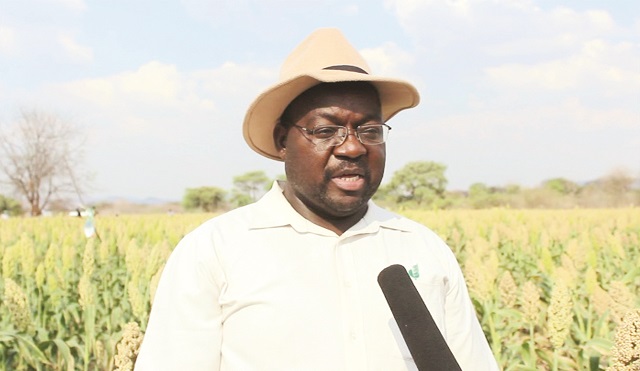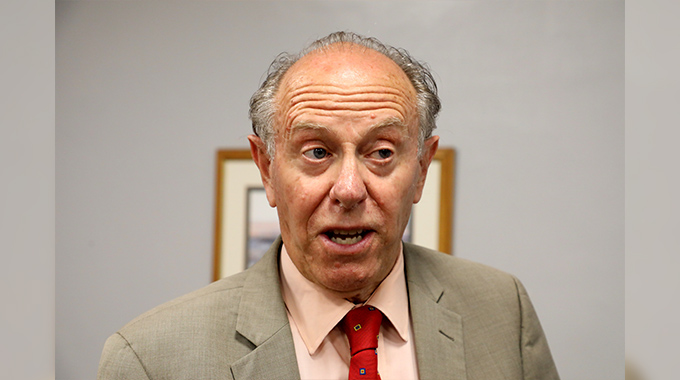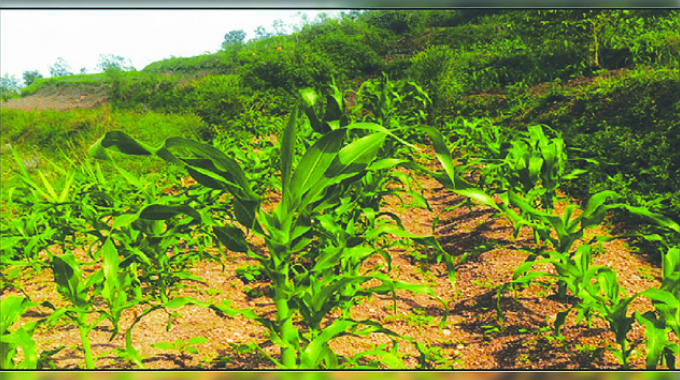Farmers discover that every dark cloud has a silver lining


Dr Kizito Mazvimavi Icrisat country representative during an interview at Lungwalala Irrigation Scheme in Binga
Tapfuma Machakaire
THE saying that every dark cloud has a silver lining has come true for farmers at Lungwalala Irrigation Scheme in Binga District of Matabeleland North Province who for over two decades had been struggling to make a living from farming on the irrigation project.
The project was established in 1993 following the construction of Lungwalala Dam by the Government in 1992. The major challenges farmers had been facing included high water bills from the Zimbabwe National Water Authority (Zinwa), deteriorating irrigation infrastructure, unavailability of farming inputs exacerbated by the poor road network in the remote district and lack of conducive markets for their produce mostly vegetables and maize.
The fortunes of the BaTonga farmers took a turn last winter when they were approached by scientists from the International Crop Research Institute for the Semi Arid Tropics (Icrisat) based at Matopo Research Centre on the outskirts of Bulawayo with an offer to partner them in replicating sorghum and pearl millet seed.
Icrisat had realised that the El Nino drought of the 2015/16 season resulted in low grain yields, and that some communities were likely to consume grain that was usually reserved for seed. The small grain production for the 2016/17 thus looked bleak. The programme was aimed at rebuilding stocks of sorghum and pearl millet foundation seed required by the small seed enterprises.
“Our mandate includes increasing productivity and ensuring food security. We had to find innovative ways of producing seed off season and what we needed was a place with the right conditions to start sorghum and pearl millet seed multiplication and Lugwalala irrigation was the ideal place for winter cropping of the crop,” said Dr Kizito Mazvimavi, Icrisat country representative.
He said the area has the appropriate warm climate and adequate water supply which is gravity fed to the irrigation scheme.
Dr Mazvimavi said it was, however, not easy to convince the farmers of the viability of the project despite having promised to provide them with free seed and to buy the produce.
“Locals were saying it was not possible to produce the crop especially pearl millet under irrigation as they had never done it,” he said.
A team of four experts led by Dr Martin Moyo from Icrisat finally got down to working with the 213 farmers as a sorghum and pearl millet seed multiplication field day was held under the theme “Building resilient sorghum and pearl millet seed systems in semi-arid areas of Zimbabwe”.
It was one of those rare occasions when the villagers had warmed up their drums to perform the sacred BaTonga traditional dance, ngoma buntimbe, a performance that mesmerised all in attendance with some visitors taking to the stage to try out their skill in the gyrations as the dancers wriggled in waves blowing their flutes and some rolling on the ground.
Irrigation project chairperson Ms Pumuzile Muleya said the seed multiplication project had come as a blessing to the farmers who had been facing a myriad of challenges.
“We could not afford the high Zinwa water charges while our irrigation infrastructure was continuing to deteriorate. We also had the challenge of buying inputs from Bulawayo over 300 kilometres from the scheme as there are no agro dealers in our area,” said Ms Muleya.
Marketing the produce had to be limited to local communities because of the poor road network in most parts of the remote district.
Ms Muleya said the coming in of Icrisat and its partners had made life easier for the farmers as they would be provided with cash on harvesting the crop.
Dr Mazvimavi said the farmers were anticipating to harvest five tonnes of sorghum Macia variety and about four tonnes of pearl millet Okashana variety.
The produce would be bought by Icrisat and was meant for Icrisat’s ongoing Climate Smart Promotion project in the Midlands, Mashonaland Central, and Masvingo provinces and for development partners involved in community seed multiplication such as Commutech as well as Agritex in Matabeleland North.
More seed would be availed to the Binga farmers to continue with the project, said Dr Mazvimavi.
Managing Director of Zimbabwe Super Seed, a community seed production company based in Masvingo, Mr Nelson Munyaka said he had discussed with the Lungwalala farmers and representatives of Agritex the idea of the Binga farmers joining Zimbabwe Super Seeds. Mr Munyaka said the aim of his organisation was that of improving access to quality and affordable seed by small holder farmers processed and packaged locally.
“I am so excited with the quality of sorghum and millet that I have seen here and I will be happy to take up this irrigation scheme to be part of Zimbabwe Super Seeds,” said Mr Munyaka.
Provincial Affairs Minister for Matabeleland North Ambassador Cain Mathema called on farmers to transform irrigation schemes into commercial enterprises.
“In essence, climate change which has made it imperative for farmers to resort to the old practice of producing small grains has yielded positive results confirming the old adage ‘every dark cloud has a silver lining,’” said Ambassador Mathema.










Comments